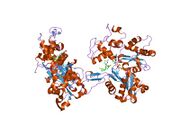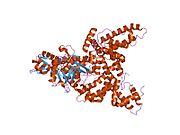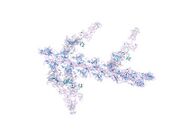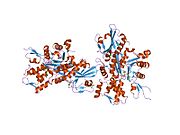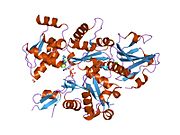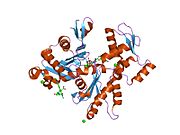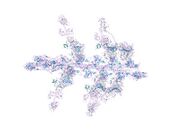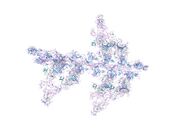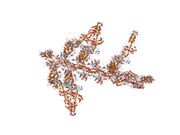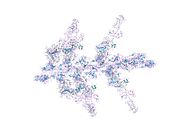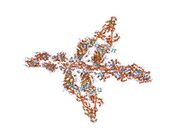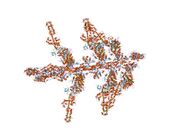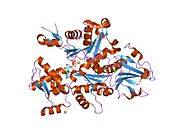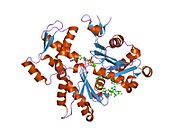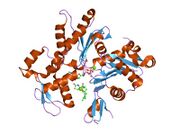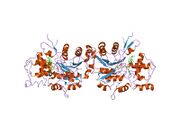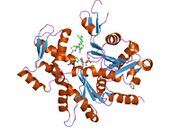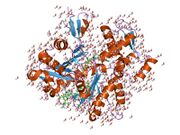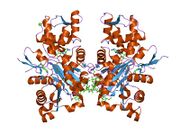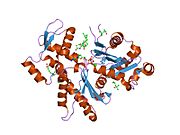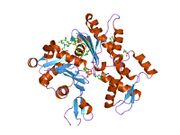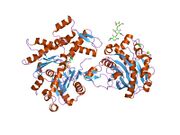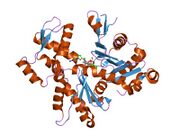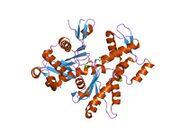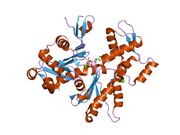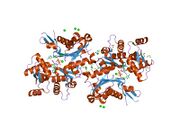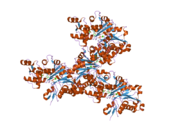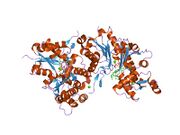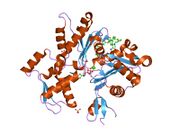Biology:ACTA2
 Generic protein structure example |
ACTA2 (actin alpha 2) is an actin protein with several aliases including alpha-actin, alpha-actin-2, aortic smooth muscle or alpha smooth muscle actin (α-SMA, SMactin, alpha-SM-actin, ASMA). Actins are a family of globular multi-functional proteins that form microfilaments. ACTA2 is one of 6 different actin isoforms and is involved in the contractile apparatus of smooth muscle. ACTA2 (as with all the actins) is extremely highly conserved and found in nearly all mammals.
In humans, ACTA2 is encoded by the ACTA2 gene located on 10q22-q24.[1][2] Mutations in this gene cause a variety of vascular diseases, such as thoracic aortic disease, coronary artery disease, stroke, Moyamoya disease, and multisystemic smooth muscle dysfunction syndrome.[1]
ACTA2 (commonly referred to as alpha-smooth muscle actin or α-SMA) is often used as a marker of myofibroblast formation.[3] Studies have shown that ACTA2 is associated with TGF-β pathway that enhances contractile properties of hepatic stellate cells leading to liver fibrosis and cirrhosis.[4]
References
- ↑ 1.0 1.1 "Entrez Gene: ACTA2 actin, alpha 2, smooth muscle, aorta". https://www.ncbi.nlm.nih.gov/sites/entrez?Db=gene&Cmd=ShowDetailView&TermToSearch=59.
- ↑ "Assignment of the vascular smooth muscle actin gene ACTSA to human chromosome 10". Jinrui Idengaku Zasshi. The Japanese Journal of Human Genetics 35 (2): 145–50. June 1990. doi:10.1007/BF01876459. PMID 2398629.
- ↑ "Alpha-smooth muscle actin expression in cultured lens epithelial cells". Investigative Ophthalmology & Visual Science 41 (5): 1122–9. April 2000. PMID 10752950.
- ↑ Hassan, Sobia; Shah, Hussain; Shawana, Summayya (2020). "Dysregulated epidermal growth factor and tumor growth factor-beta receptor signaling through GFAP-ACTA2 protein interaction in liver fibrosis". Pakistan Journal of Medical Sciences 36 (4): 782–787. doi:10.12669/pjms.36.4.1845. PMID 32494274.
Further reading
- "The cleavage of host cell proteins by HIV-1 protease". Folia Biologica 42 (5): 227–30. 1997. doi:10.1007/BF02818986. PMID 8997639.
- "HIV-1 protease cleaves actin during acute infection of human T-lymphocytes". AIDS Research and Human Retroviruses 8 (2): 291–5. February 1992. doi:10.1089/aid.1992.8.291. PMID 1540415. https://zenodo.org/record/1235231.
- "Nucleotide sequences of the rabbit alpha-smooth-muscle and beta-non-muscle actin mRNAs". Gene 112 (2): 265–6. March 1992. doi:10.1016/0378-1119(92)90388-6. PMID 1555776.
- "Actin, troponin C, Alzheimer amyloid precursor protein and pro-interleukin 1 beta as substrates of the protease from human immunodeficiency virus". The Journal of Biological Chemistry 266 (22): 14548–53. August 1991. doi:10.1016/S0021-9258(18)98721-1. PMID 1907279.
- "Smooth muscle alpha-actin is a marker for hair follicle dermis in vivo and in vitro". Journal of Cell Science 99 ( Pt 3) (3): 627–36. July 1991. doi:10.1242/jcs.99.3.627. PMID 1939373. https://archive-ouverte.unige.ch/unige:11044.
- "TaqI polymorphism in the 3' flanking region of the human aortic smooth muscle actin gene". Nucleic Acids Research 18 (5): 1318. March 1990. doi:10.1093/nar/18.5.1318. PMID 1969628.
- "Non-viral cellular substrates for human immunodeficiency virus type 1 protease". FEBS Letters 278 (2): 199–203. January 1991. doi:10.1016/0014-5793(91)80116-K. PMID 1991513.
- "Transcriptional regulatory elements in the 5' upstream and first intron regions of the human smooth muscle (aortic type) alpha-actin-encoding gene". Gene 99 (2): 285–9. March 1991. doi:10.1016/0378-1119(91)90140-7. PMID 2022339.
- "Structure of the human smooth muscle alpha-actin gene. Analysis of a cDNA and 5' upstream region". The Journal of Biological Chemistry 265 (3): 1683–7. January 1990. doi:10.1016/S0021-9258(19)40070-7. PMID 2295650.
- "Structure of 3'-downstream segment of the human smooth muscle (aortic-type) alpha-actin-encoding gene and isolation of the specific DNA probe". Gene 84 (2): 455–62. December 1989. doi:10.1016/0378-1119(89)90520-9. PMID 2612915.
- "The nucleotide sequence of a human smooth muscle alpha-actin (aortic type) cDNA". Nucleic Acids Research 17 (4): 1767. February 1989. doi:10.1093/nar/17.4.1767. PMID 2701935.
- "The human beta-actin multigene family". Transactions of the Association of American Physicians 98: 42–6. 1986. PMID 3842206.
- "Structure of a human smooth muscle actin gene (aortic type) with a unique intron site". Molecular and Cellular Biology 4 (6): 1073–8. June 1984. doi:10.1128/MCB.4.6.1073. PMID 6330528.
- "A vascular smooth muscle alpha-isoactin biosynthetic intermediate in BC3H1 cells. Identification of acetylcysteine at the NH2 terminus". The Journal of Biological Chemistry 259 (11): 7224–9. June 1984. doi:10.1016/S0021-9258(17)39861-7. PMID 6725286.
- "Reexamination of chromosomal loci of human muscle actin genes by fluorescence in situ hybridization". The Japanese Journal of Human Genetics 40 (1): 145–8. March 1995. doi:10.1007/BF01874078. PMID 7780165.
- "Dependence of collagen remodelling on alpha-smooth muscle actin expression by fibroblasts". Journal of Cellular Physiology 159 (1): 161–75. April 1994. doi:10.1002/jcp.1041590120. PMID 8138584.
- "Alpha1-syntrophin has distinct binding sites for actin and calmodulin". FEBS Letters 423 (2): 173–7. February 1998. doi:10.1016/S0014-5793(98)00085-4. PMID 9512352.
- "Human smooth muscle alpha-actin gene is a transcriptional target of the p53 tumor suppressor protein". Oncogene 16 (10): 1299–308. March 1998. doi:10.1038/sj.onc.1201645. PMID 9546431.
External links
- GeneReviews/NIH/NCBI/UW entry on Thoracic Aortic Aneurysms and Aortic Dissections
- Human ACTA2 genome location and ACTA2 gene details page in the UCSC Genome Browser.
 |









